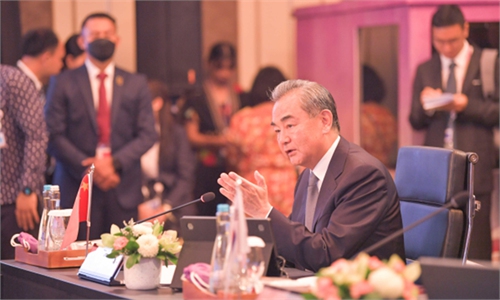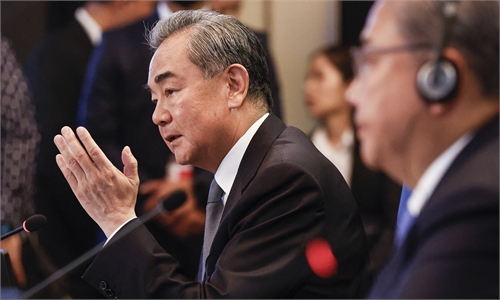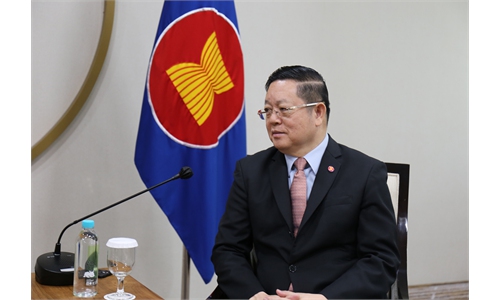China sends message of cooperation in Jakarta, supports ASEAN centrality
Nation calls for shared future, opposes power competition in region
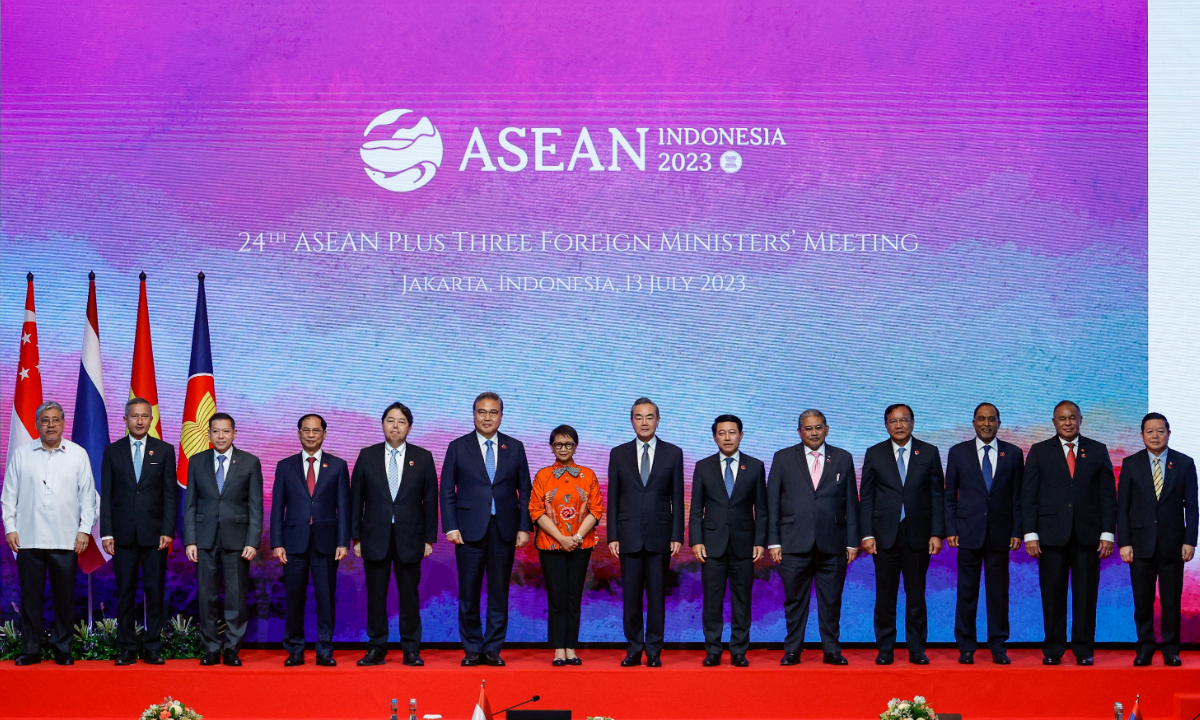
The ASEAN Plus Three (APT) Foreign Ministers' Meeting is held in Jakarta, Indonesia on June 13, 2023. Photo:AFP
Senior Chinese diplomat Wang Yi repeatedly mentioned keywords such as "cooperation", "peace and stability", "ASEAN centrality" and "development" in his remarks at ASEAN foreign ministers' meetings and bilateral meetings on Thursday and Friday in Jakarta.
When major-power competition has infiltrated Southeast Asia, China sends a firm and clear message to advocate for regional solidarity and enhanced cooperation, with the hope of offsetting external attempts to stir up trouble and sow discord among regional countries, analysts said.
Wang Yi, director of the Office of the Foreign Affairs Commission of the Communist Party of China Central Committee, called on ASEAN, together with China, Japan and South Korea, to strengthen cooperation at the ASEAN Plus Three (APT) Foreign Ministers' Meeting on Thursday.
At the meeting, all the parties supported an open and inclusive ASEAN-centered regional cooperation framework, adhering to multilateralism, and maintaining regional peace, stability and prosperity.
At the China-ASEAN 10+1 meeting, Wang revealed that progress is being made on version 3.0 of a free trade agreement (FTA) and underscored landmark projects in the joint construction of the China-proposed Belt and Road Initiative.
The meeting passed a joint statement on the 20th anniversary of China's accession to the Treaty of Amity and Cooperation in Southeast Asia and formed a guideline document to speed up the Code of Conduct (COC) for the South China Sea, according to a routine press briefing of Chinese Ministry of Foreign Affairs on Friday.
At a meeting with Singaporean Foreign Minister Vivian Balakrishnan on Wednesday, Wang noted that China and ASEAN should jointly safeguard the global free trade system and uphold ASEAN centrality.
Xu Liping, director of the Center for Southeast Asian Studies at the Chinese Academy of Social Science, said that China has always shouldered the responsibility of a major regional power, seeking to maximize common interests, properly manage differences through negotiation, and work toward shared development and prosperity of the region.
Commenting on recent incidents surrounding the South China Sea, Xu called for "consultations and negotiations by sovereign states directly concerned" and said related parties should not internationalize or complicate the issue.
Tang Qifang, an associate research fellow at the China Institute of International Studies, told the Global Times that regional countries should stay vigilant to any attempt to exaggerate certain disputes or intensify the situation.
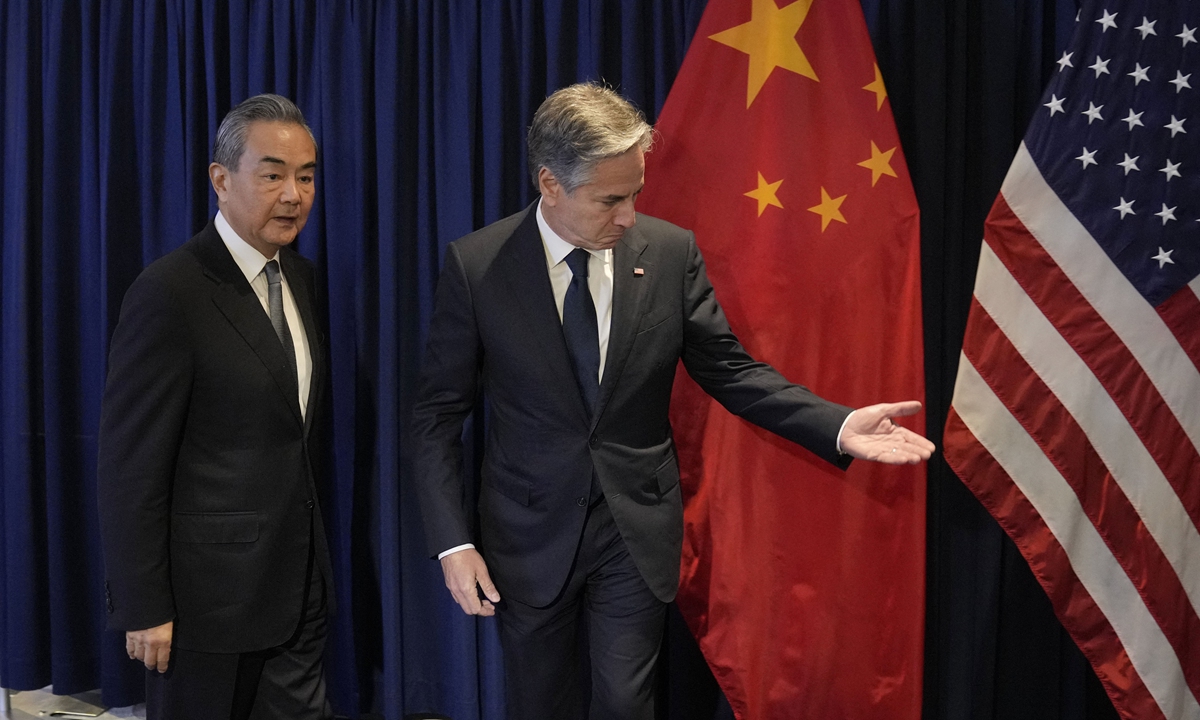
Wang Yi, Director of the Office of the Central Commission for Foreign Affairs of the Communist Party of China Central Committee, meets with US Secretary of State Antony Blinken on the sidelines of the ASEAN Foreign Ministers’ Meeting in Jakarta on July 13, 2023. Photo: AFP
Wang Yi, during the meeting with US Secretary of State Antony Blinken on the sidelines of the ASEAN meetings, noted, "As major countries with important influence, China and the US should respect the efforts of regional countries, support ASEAN centrality, and avoid bringing disputes and complex factors into regional cooperation."
China's ties with ASEAN focus on shared benefits, but it is not exclusive, analysts said. China welcomes ASEAN member states to conduct cooperation with other countries, as the region should be an engine of global growth, not an arena of power competition.
Gu Xiaosong, dean of the ASEAN Research Institute of Hainan Tropical Ocean University, told the Global Times that the US' engagement with ASEAN member states is obviously driven by its rivalry with China and aims to mobilize the bloc to push forward its Indo-Pacific Strategy.
The US' "cooperation with ASEAN" is therefore centered on containing China, including "decoupling" pushes and stronger military presence, analysts said, citing the Indo-Pacific Economic Framework, military architectures such as the Quad and AUKUS, frequent drills around the South China Sea and US access to another four Philippine military bases in April.
Analysts stressed that for emerging economies in the region, taking sides with either China or the US does not serve their interests or sustainable development. ASEAN member states are encouraged to do what they can to bring about sustainable security and prosperity, not things that generate division and chaos.
